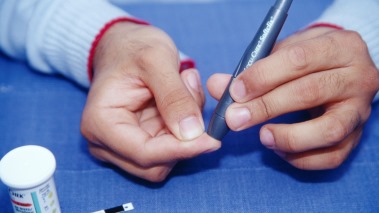
The classes should be offered when patients are diagnosed and usually cover diet advice, weight loss for adults who are overweight, exercise and information about medicines.
Adults with type 1 diabetes should also have structured education between 6 months and year after diagnosis once they have an agreed treatment regime.
These classes should cover checking blood glucose levels, using insulin and advice about having a healthy lifestyle, and are usually held at hospitals or specialist centres.
The new NICE quality standard diabetes in adults was published Thursday 18 August and is aimed at commissioners.
Professor Gillian Leng, deputy chief executive of NICE, said: “Around 3.5 million people in the UK have been diagnosed with diabetes. The condition is complex and has a large impact on people’s lives. Helping people to understand and self-manage their diabetes is vital.
“Of all adults with diabetes, 10% have type 1 and they need to develop a large range of new skills and knowledge to manage their condition. They have to take insulin, so getting the right balance in their treatment routine to suit their individual circumstances and daily life can take a while. This quality standard therefore says that in addition to giving people with type 1 diabetes information from diagnosis, also providing a more intensive structured education programme is most useful once their diabetes management routine is settled.
“However for adults with type 2 diabetes, structured education should be provided at diagnosis to improve their knowledge, and also to help motivate them to take control of their condition and self-manage it effectively.”
Quality standards help identify good quality services for commissioners of NHS care and help patients identify what should be on offer to them.
New statements include:
- a referral to an intensive lifestyle-change programme – to help people to become more physically active, improve their diet and lose weight if needed – should be offered to adults at high risk of type 2 diabetes, to reduce their chances of developing the condition
- adults with type 2 diabetes whose average blood glucose(HbA1c level) is 58 mmol/mol (7.5%) or above after 6 months of single-drug treatment should be offered an additional drug.
In addition, the statement on limb-threatening or life-threatening diabetic foot problems has been updated to highlight that adults with this complication should be referred immediately for specialist assessment and treatment.
Dr Ian Lewin, expert advisor to the NICE quality standard and retired consultant endocrinologist, said: “Many cases of type 2 diabetes are preventable through changes to a person’s diet and physical activity levels. Evidence-based intensive lifestyle-change programmes can significantly reduce the risk of developing the condition for people at high risk.
“For people who already have type 2 diabetes, reaching and maintaining near normal blood glucose levels is important to reduce the tissue damage caused by high blood glucose.
“A second drug should be offered if average blood glucose levels are still too high. This can help avoid long-term health problems such as diabetic foot ulcers and amputations, premature heart disease, blindness and stroke.”